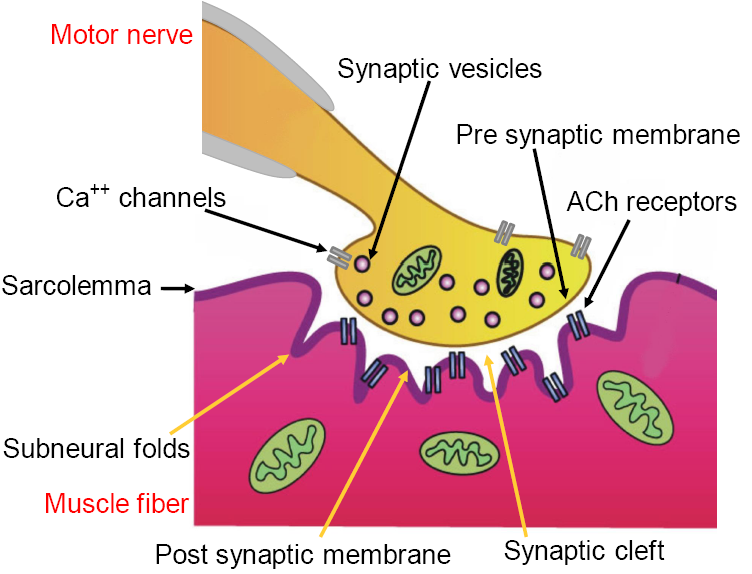Synaptic contact between somatic motor nerve and a skeletal muscle fiber
Transfer of impulse from nerve to muscle
Events at nerve terminal
►Arrival of action potential
►Opening of voltage gated Ca++channels
►Ca++influx in nerve terminal
►Docking of ACh vesicles
►Release of ACh into synaptic cleft
►Events at muscle fiber membrane
►Binding of Ach to nicotinic receptors
►2 molecules bind with 2 αsubunit of receptor
►Opening of Ach gated cation channels
►Influx of Na+, Ca++(efflux of K+also occurs)
►Generation of end plate potential (EPP)
Neuromuscular junction
End plate potential
►Graded potential generated in muscle fiber due to influx of Na+through ACh gated cation channels
►Brings the voltage to threshold for action potential
►Normally three times greater than threshold (↑↑↑ safety factor)
End plate potential
►If less than threshold
►Action potential in muscle fiber will not be generated
►Generation of action potential in muscle fiber
►Rise in voltage to threshold due to EPP
►Opening of voltage gated Na+channels
►Generation of action potential
►Spread of action potential along sarcolemma and into ‘T’ tubules
Removal of Ach from synaptic cleft
►Diffusion into the adjacent area
►Acetylcholinesterase
►Enzyme present in synaptic cleft
►Breaks Ach into choline and acetate (within 1 ms)
►Choline is reuptaken into nerve terminal and reused to form ACh
►Miniature end plate potential
►Weak EPP due to spontaneous release of Ach
►Up to 0.5 mv
►Can not produce action potential
Chemicals affecting NMJ
NMJ stimulants
►Acetylcholine like drugs
►Nicotine, methacholine, carbachol
►Stimulate Ach receptors
►Anticholinesterases (used as drugs)
►Neostigmine, physostigmine, edrophonium (tensilon)
►Temporarilyinhibit AChE
►NMJ stimulants
►Anticholinesterases -inhibit AChE irreversibly or for prolonged period
►Organophosphates
►irreversibly inhibit AChE
►Diisopropyl fluorophosphate (nerve gas)
►Inhibits AChE for weeks
NMJ blockers
►Curare -arrow head poison
►Blocks ACh receptors
►Cant be destroyed by AChE
►Death occurs due to paralysis of respiratory muscles (asphyxiation)
►Curariform durgs (gallamine)
►Used for muscle relaxation during surgery
NMJ blockers
►Botulinum toxin
►Causes food poisoning -botulism
►Blocks release of ACh
►Death may occur due to asphyxiation
►Therapeutic use of botulinum (botox)
►Cosmetic -to treat wrinkles
►Chronic back pain etc
Myasthenia gravis
►A neuromuscular disorder leading to muscular weakness & fatigability
►Etiology
►Autoimmunity -antibodies against ACh receptors
►Destruction of receptors
►Blockage of receptors
Pathophysiology
►Nicotinic receptors available for ACh are too less
►EPP less than threshold (Safety factor < 1)
►No action potential in muscle fiber
►No muscular contraction
Clinical features
►Easily fatigability and muscular weakness
►Diplopia, ptosis
►Disphagia
►Disarthria
►Paralysis of respiratory muscles and death
Incidence
►1 in 20000
►More common in women
►Death may occur due to paralysis of respiratory muscles
Treatment
►Anticholinesterases
►Neostigmine, physostigmine etc
►Immunosuppresion
►Plasmapheresis
►Thymectomy
 howMed Know Yourself
howMed Know Yourself

